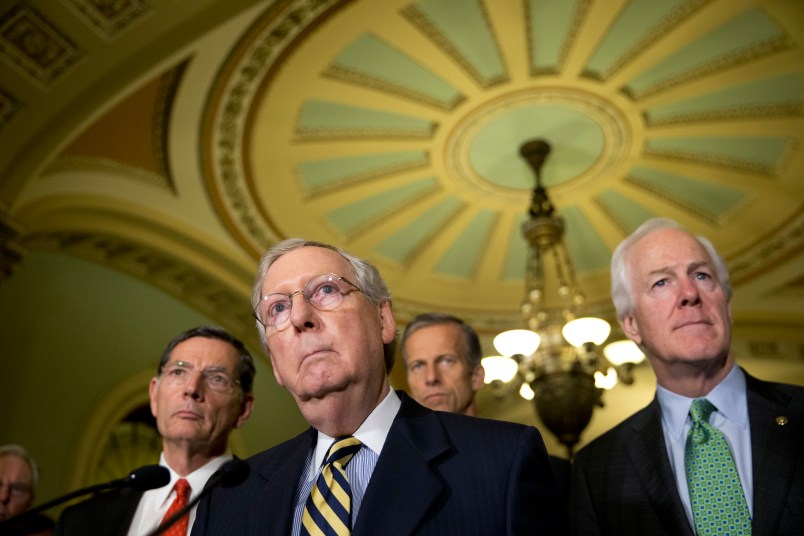House Republicans were in a celebratory mood Thursday after narrowly passing their Obamacare repeal bill. Now they get to watch the Senate do something completely different.
After weeks of holding at arm’s length the messy negotiations in the lower chamber, Senate Republicans on Thursday made clear that they had started working on their own bill, albeit one that will “incorporate” some parts of the House bill, according to Sen. Roy Blunt (R-MO), a member of GOP Senate leadership.
Assuming that GOP Senate can settle on the plan that can garner 51 Republican votes, the House and the Senate will have to then reconcile their two versions before each chamber takes a final vote – meaning the ultimate legislation to dismantle Affordable Care Act is still multiple steps away.
For now, the next stage of the process is a plan being worked on by a 12-member Senate GOP working group, according to a Washington Examiner report. Majority Whip John Cornyn (R-TX), a working group member, said they have been discussing for weeks how to “build a consensus.”
The dynamics in the House to get enough votes to pass its legislation, the American Health Care Act, were messier than many expected. The calculus on the Senate side isn’t any simpler. Republicans there will have a much smaller margin of error; they can lose only two votes and still pass it through the reconciliation process, which will avoid a Democratic filibuster. The process also imposes strict rules that constricts what they include in their legislative package.
Furthermore, many senators don’t have the luxury of representing purely red territory. On health care specifically, the Senate GOP caucus is split beyond just the typical ideological lines.
Twenty Republicans senators represent states that participated in the ACA’s Medicaid expansion, which the House bill starts phasing out in 2020. Three GOP senators have raised concerns about the legislation’s provision to defund Planned Parenthood. And, as the latest version of House bill was gaining momentum, a few Republican senators fired warning shots that its weakening of pre-existing conditions protections wouldn’t fly in the upper chamber.
For the most part, Senate Republicans have been happy to keep their heads down and let their House counterparts duke it out over whatever could get the repeal effort out of the lower chamber. But at a few key inflection points, they have hinted that major changes were already in the works.
It was a handful of Senate Republicans who most vocally demanded a replacement plan to be passed along with repeal, instead of the GOP’s initial approach of repeal and delay. Sen. John Thune (R-SD), the No. 3 in Senate GOP leadership, has said he was working on making the House’s tax credits less stingy for old people, while Sen. Rob Portman (R-OH), who represents an expansion state, said in a statement Thursday that the House bill “ does not do enough to protect Ohio’s Medicaid expansion population.”
Sens. Bill Cassidy (R-LA) and Sen. Susan Collins (R-ME) released their own replacement bill a few months ago that took a far more moderate approach than the House’s. The hardline conservatives in the Senate, Sens. Mike Lee (R-UT), Ted Cruz (R-TX) and Rand Paul (R-KY), meanwhile supported the House Freedom Caucus efforts to drag the bill farther to the right.
The House bill that passed Thursday would impose massive cuts on Medicaid, scale back the Affordable Care Act’s tax credits, make some of its insurer mandates optional for states and eliminate most of its taxes. A CBO score that analyzed an initial version of the bill, before it underwent significant changes, found that 24 million fewer people would be covered over 10 years while the federal government reaped $150 billion in savings. Many health care experts believe the CBO’s coverage numbers will look worse now the bill was changed to weaken the ACA’s consumer protections
In a floor speech soon after Thursday’s House vote, Senate HELP Chairman Lamar Alexander (R-TN), whose committee has partial jurisdiction over the health care bill, laid out his vision for where the Senate bill will ultimately land: “rescue” those in areas with no ACA plans; “lower premium costs;” “gradually” give states more “flexibility” on Medicaid, without pulling the “rug out” from enrollees; and making sure those with “ pre-existing health conditions have access to health insurance.”
After the House blew through various arbitrary deadlines – often imposed by the White House – in passing its legislation, Senate GOP leaders are resisting any set schedule.
“There’s no timeline. When we get 51 senators, we’ll vote,” Cornyn said, according to Roll Call.







Ahhhhhhhh…now every moment will be around the Senate while the House is sneaking in tax reform.
The Senate, as was the case with the House, will have the ulterior motive of stripping away actual “health care” and replacing it with a pile of words with a slick name. A pig with lipstick and a pearl necklace on it.
Cable news will bandy about “possibilities” in unending panels of experts that will conclude nothing but will show their political stripes for all to see. Rump is right about the “fake news” thingy but doesn’t admit that they held his hand all the way to the White House. He is right that it is “sad”.
Cut to the chase … there are only two choices … Medicare for all or Soylent Green.
Please proceed, Senators!
Who, in their right mind, wouldn’t be heartened that those four cheerful senators will make deplorable care more palatable for everyone?
In a polite way Senate Republicans have basically informed House members that should they do anything about this bill, it won’t look ANYTHING like the House’s fantasy bill.
I imagine it will be more of a civics lesson than ACA “repeal”.